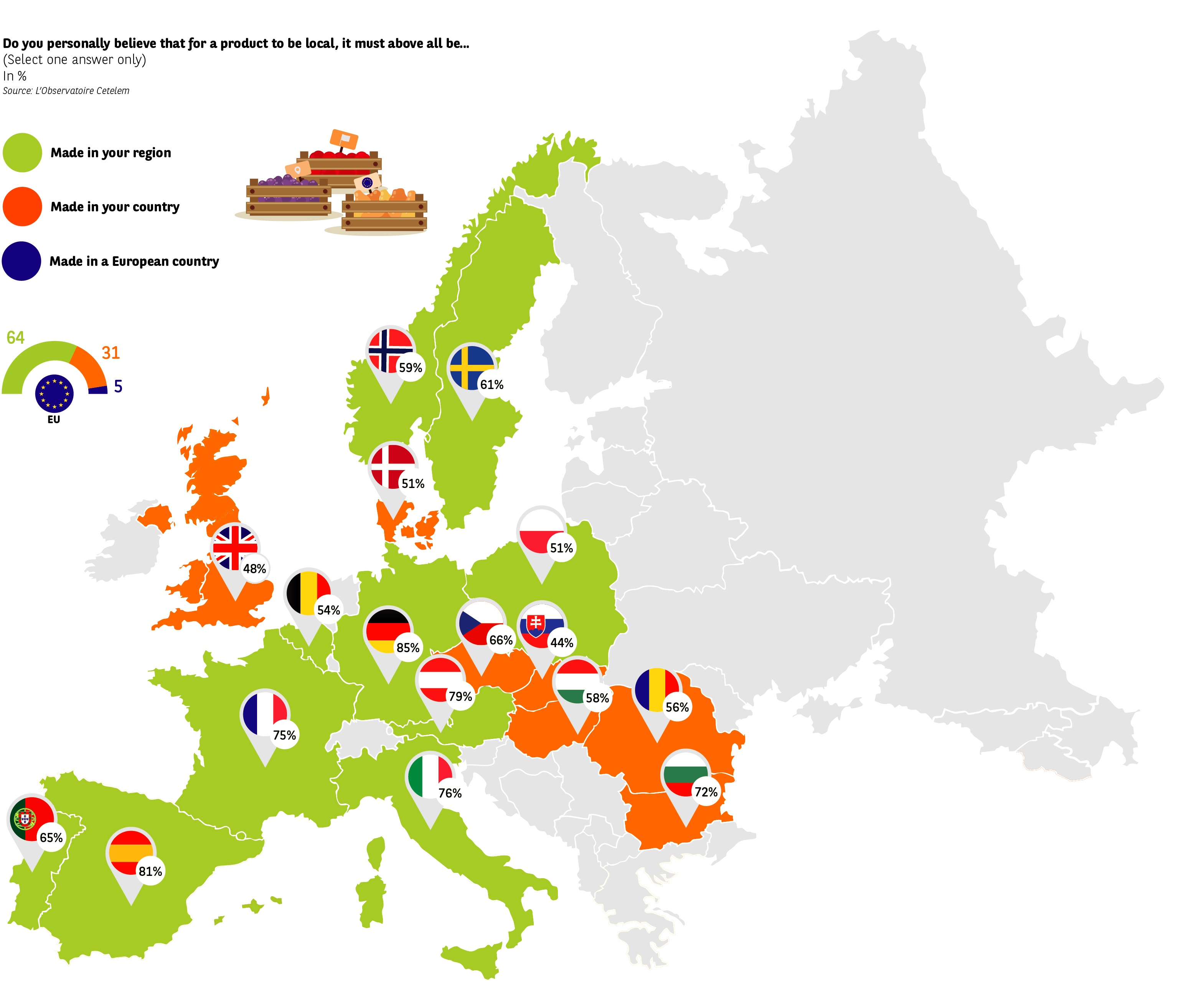Local consumption: circumstances vary, but certain values are universal


A CONCEPT BROUGHT UP TO DATE
Local consumption, which is usually taken as meaning regional, is gaining ground among Europeans. They like the products and recognise their advantages. They see them as embodying the values they hold dear. However, as is often the case, their desire to consume local products is quelled by the price, a barrier that is even harder to overcome when economic conditions are tough. But they are prepared to back this philosophy further, even if they have to pay a little more, on condition that the authorities support its development.
Discussing a topic first requires a definition of its scope and the semantic reality it encompasses. In the case of local consumption, this scope is obviously geographical, but it is also social and economic.
Food-related crises, such as mad-cow disease in Europe and the Chinese milk scandal, have led many consumers to seriously question the wisdom of a consumption model that they see as lacking in boundaries. This has led to the Local First movement in the United States, as well as the creation of AMAPs (associations supporting local farmers) in France, Food Co-ops in the United Kingdom, fair purchasing groups in Italy and GASAPs (fair purchasing groups supporting local farmers) in Belgium.
One Hundred Miles! Launched in the United States on World Environment Day in 2005, the challenge set was to only consume products cultivated or manufactured within a 100-mile radius. The term “locavore” was born. Two years later, it was included in the New Oxford Dictionary and named word of the year by Oxford University Press. Its etymology, a contraction of the Latin words “locus”, meaning location, and “vorare”, meaning swallow, suggests that the point of consumption is more important than the product. Obviously, it is difficult in today’s world to be a hardline locavore. European countries that produce cotton are few and far between, yet t-shirts are still made on the continent. And what about Skodas assembled in the Czech Republic and Toyotas built in France? What is their nationality? Can we consider these products to fulfil the requirements of locavores?
LOCAL PRODUCTS: REGIONAL IN THE WEST, NATIONAL IN THE EAST
Europeans tend to have a very clear idea about what constitutes a local product.
On average, 64% consider that a local product is one manufactured in the region they inhabit. 31% believe that local equates to national. Only 5% see it as meaning European, which perhaps illustrates a lack of regard for the single market.
However, a wide range of views can be observed on the topic. Germany, Spain, Austria, Italy, France and Portugal form a six-strong group of “regionalists”, posting scores that are, for the most part, much higher than the European average (85%, 81%, 79%, 76%, 75% and 65%, respectively). Meanwhile, in several Eastern European countries, people consider a local product to be one produced in their own country, an opinion held particularly strongly in Bulgaria and the Czech Republic (72% and 66%) In between we have the UK, which is divided on the question (46% regional, 48% national), as are Poland, Denmark and Belgium, but to a lesser extent. There is also a trio of nations whose view is slightly different. The Slovaks, Czechs and Romanians give a degree of credence to the idea that a local product can be one that is made in Europe (34%, 22% and 17%).
A FONDNESS FOR LOCAL PRODUCTS…
Europeans are full of praise for local products.
These products are undoubtedly appreciated. 89% of Europeans say so. The Austrians, Germans, Italians and Romanians are the keenest (93%, 92%, 92% and 90%). The Norwegians and Danes are slightly less enthusiastic (74% and 79%).
84% appreciate their quality, as exemplified by the Germans and Austrians, once again, but also the French (89%, 91% and 91%). The Bulgarians are something of an outlier in this regard, since just 50% of those surveyed laud the quality of local products.
Another plus point posited is the quality of manufacturing conditions and processes, as highlighted by 81% of those surveyed. This is something the French are very enthusiastic about and the Bulgarians more circumspect (87% vs. 52%).
… AND THE VALUES THEY EMBODY
Boasting various qualities, local consumption now holds a special place in the hearts of European consumers.
An active interest in local consumption
Just 17% of Europeans declare that this is an issue to which they pay no attention. The level of indifference is highest in the United Kingdom (28%). Such attitudes are rarest in Portugal and Italy (8% and 10%).
Almost a quarter of Europeans feel strongly about local consumption and consider it to be an objective they deliberately set themselves. This is particularly true in Spain, where half of all consumers are keen to consume locally. The British and Poles are the least committed (16%). Overall, consumers also believe that the trend is here to stay, with just 6% opining that it is just a flash in the pan.
Protecting the environment, an ideal that is not universal
Sensitivity to this issue rests upon clearly identified values. First and foremost, Europeans see local consumption as a good way of protecting the environment. 42% are of this opinion. But behind this figure lie two groups of nations that harbour very different intentions. On the one hand, we have countries whose environmental maturity is unquestionable, prompting political debate, policy measures and concrete initiatives. In these countries the notion of short supply chains is no longer the preserve of specialists. This is particularly true in Sweden (61%), Germany and Austria (55%) and Italy (47%). On the other hand, we have primarily Eastern European countries and Portugal, where economic development is not yet synonymous with green thinking. Indeed, just 16% of Bulgarians and 22% of Romanians view local consumption as an opportunity to help the environment.
National pride, especially in the east
Local consumption in these countries is chiefly driven by strong patriotic feelings. This is especially true for the Poles (35%) and Romanians (34%). It is interesting to note that Austria and Germany share this sense of national pride (33% and 32%). Only 14% of Italians are keen to defend their flag in this way, a similar figure to most of the Nordic countries.
Pride and duty are the next most important values among Europeans (20%). Pride is the watchword for most Eastern Europeans, whose personal conviction goes hand in hand with patriotic feelings. This is the case for 30% of Romanians and 27% of Czechs and Bulgarians. The Portuguese and Italians are most likely to see it as a duty, with France not too far behind (45%, 34% and 25%). Most of the other nations post a below average score, with Sweden at the bottom of the list (9%).

